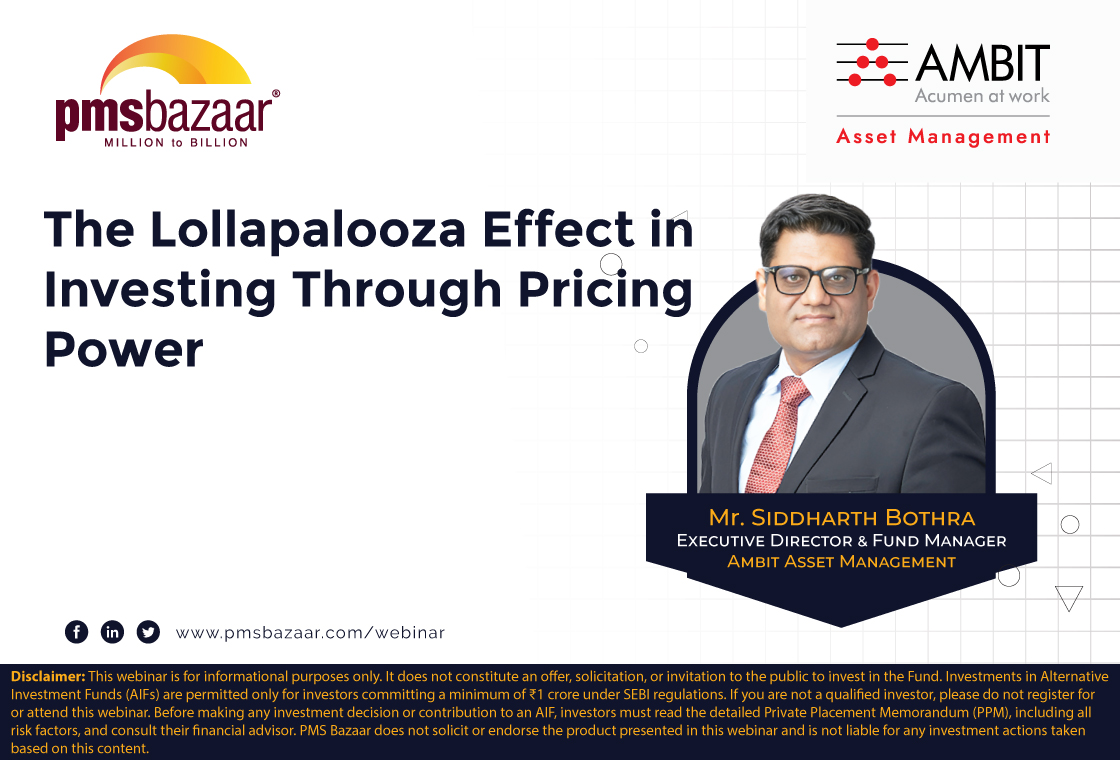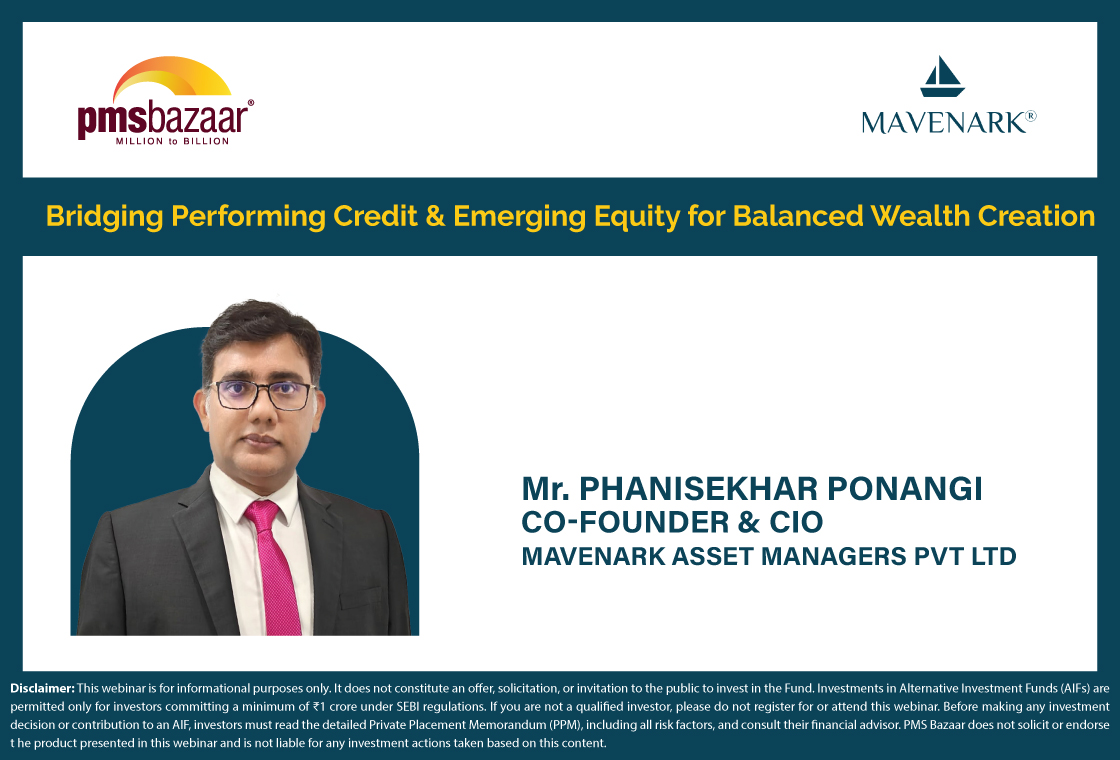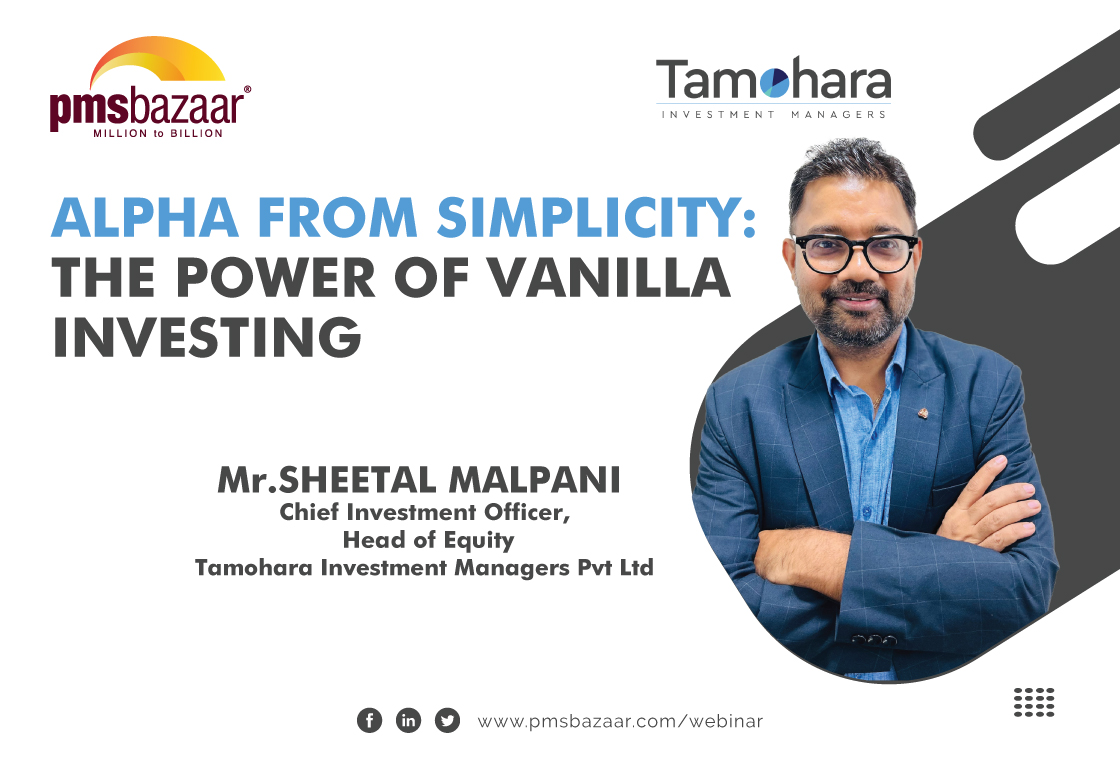PMS Bazaar recently conducted a Podcast Interview Series - "The Power of Compounding Wealth," where seasoned Fund Managers reveal their invaluable insights into financial success and wealth-building strategies. This blog covers the excerpts from the first episode of this interview series, with Mr. Rohan Mehta, CEO and Fund Manager, of Turtle Wealth Management, as the guest speaker.

Excerpts from the Podcast
The power of compounding is an essential concept that holds the key to unlocking tremendous opportunities for building and growing wealth over time. As investments continue to compound over extended periods, the impact becomes increasingly profound, laying the foundation for significant financial accomplishments. In this context, Mr. Rohan Mehta provided enlightening insights as he answered several pivotal questions during the interview.
Market Fundamentals and Growth Analysis
Mr. Rohan Mehta was asked to give his view on the factors influencing the current positive sentiment in the Indian markets and compare its short-term performance and long-term growth potential. According to Mr. Mehta, the Indian markets are surging to new highs, with the Sensex reaching approximately 66,000 and Nifty hovering around 19,500 to 19,600 levels. Although the market has shown considerable growth, it is crucial to consider both short-term and long-term perspectives.
In the short term, the market has performed well, experiencing an increase from USD 14,000 to USD 17,000. However, in the long term, the growth rate has doubled over the last two and a half years, as the market has not witnessed substantial expansion since 2021.
Despite this, overall market sentiment remains positive due to various macroeconomic factors and global optimism. India is seen as a promising market with growth potential similar to what China experienced when its market cap rose from 2 trillion to 5 trillion dollars.
Interestingly, it is observed that non-resident Indians (NRIs) and foreigners display higher bullishness for Indian markets compared to local investors. This widespread optimism stems from the positive perception of India's growth trajectory and macroeconomic indicators.
In conclusion, the markets are currently at new peak levels, exhibiting both short-term success and long-term potential. Various macro factors, a positive global outlook, and emerging market segments contribute to the optimistic sentiment surrounding the Indian markets.
Global Rally and India's Optimism in 2023
According to Mr. Rohan, “The global markets have performed exceptionally well in 2023, and India is catching up with this positive trend. The question arises whether this global rally is fueling the optimism or if there are other factors contributing to the positive sentiment.”
Indeed, the global rally is backed by solid numbers, making it a driving force behind the prevailing optimism. Analyzing the Indian market, it becomes evident that several factors contribute to this positive outlook. First and foremost, there is a considerable rise in consumption patterns, and corporate governance has improved significantly. Indian entrepreneurs are taking the country forward with a promising vision.
Moreover, the guidance provided by Prime Minister Modi has been instrumental in fostering a positive environment. This positive sentiment in the Indian market coincides with the overall optimism in the world market, further reinforcing the positive outlook.
However, it is essential to remember that not all positive trends guarantee financial success. While several sectors, such as IT and pharmaceuticals, continue to show promise, they have yet to deliver substantial returns to investors. Therefore, it remains crucial for investors to be selective and diligent in their portfolio choices, whether they are dealing with a bull or bear market.
The Power of Compounding: The Investment Strategy
In response to the question about how Turtle ensures that its fund investment approach aligns with the principle of compounding, Mr. Rohan emphasized the significance of the "Power of Compounding" series and its implications on their investment strategy. He stressed that aligning with the principle of compounding over time is fundamental for them. The core idea behind compounding lies in retaining profits and avoiding the temptation of pursuing short-term gains, a concept that many investors understand but often struggle to uphold due to the allure of quick successes.
Turtle's fund strategy is designed to capitalize on the power of compounding by focusing on companies with strong leadership, unique advantages in their respective industries, and potential for sustained growth. They consistently identify and add such businesses to their portfolio to harness the compounding effect in their investments.
Mr. Rohan acknowledged that not every company in their portfolio will be a compounder and that managing risks is essential. Turtle takes an active approach in setting clear exit points before entering a stock. If a company performs well, they hold the shares, allowing the compounding process to unfold. However, if a company faces challenges or no longer meets their criteria, they are willing to sell and seek other promising investments.
He highlighted the importance of understanding that managing public money comes with the expectation of achieving results within a reasonable timeframe. Typically, Turtle's funds maintain an average holding period of around 2 to 4 years. During this time, the fund manager strives to demonstrate the progress of their chosen investments and the potential for compounding gains. While achieving compounding may not be easy, Mr. Rohan firmly believes it is the most effective path to long-term success in investment management.
Next Surge for Earnings: Focus on NBFCs, Financials, Auto, and PSUs
According to Mr. Mehta, the next surge in earnings is anticipated to come from various sectors, focusing on Non-Banking Financial Companies (NBFCs), financials, auto, and Public Sector Undertakings (PSUs).
Among the financials, the NBFC sector is deemed particularly interesting due to recent developments. The financial space in the Nifty 500 index is expected to contribute around 30% of the total earnings. Besides financials, the auto industry also shows promising growth potential. However, it is the PSUs that present intriguing opportunities, especially in the domains of manufacturing, defense, and heavy engineering, making them potential surprises in terms of earnings.
Mr. Rohan Mehta discussed several other questions in detail. Listen to the Full Podcast Interview on any of your favorite platforms & relive the entire session - Click HERE
Recent Blogs

PMS performance hit by broad market slump in July; Thematic strategies buck the trend
Of 427 equity PMSes, only 61 gained; Debt offerings showed positive returns. July 2025 proved to be a testing month for Portfolio Management Services (PMS) investors, with broad-based declines across most asset classes.

July tests AIF resilience; Long-short strategies lead relative gains game
Only 44 of 137 AIFs ended positive; long-only funds averaged –1.15%, while long-short peers limited losses to –0.29%

The Lollapalooza Effect in Investing Through Pricing Power
PMS Bazaar recently organized a webinar titled “The Lollapalooza Effect in Investing Through Pricing Power” which featured Mr. Siddharth Bothra, Executive Director and Fund Manager, Ambit Asset Management. This blog covers the important points shared in this insightful webinar.

The Secret Sauce of Quant PMS
PMS Bazaar recently organized a webinar titled “The Secret Sauce of Quant PMS,” which featured Mr. Vivek Sharma, VP & Investment Head, Estee Advisors Private Limited.

Bridging Performing Credit and Emerging Equity for Balanced Wealth Creation
PMS Bazaar recently organized a webinar titled “Bridging Performing Credit and Emerging Equity for Balanced Wealth Creation,” which featured Mr. Phanisekhar Ponangi, Co-Founder and CIO, MavenArk Asset Managers Pvt Limited. This blog covers the important points shared in this insightful webinar.

Equity PMS performance steady in June; over 99% in green as rally broadens
Best schemes log 10-19% gains, but the overall extent of outperformance vs. benchmarks was lower compared to May

June Brings Steady Gains for AIFs; Long-Only Strategies Maintain Lead
126 of 129 AIFs ended in the green; long-only funds averaged 3.75%, while long-short peers delivered a modest 2.18%

Alpha from Simplicity: The Power of Vanilla Investing
PMS Bazaar recently organized a webinar titled “Alpha from Simplicity: The Power of Vanilla Investing,” which featured Mr. Sheetal Malpani, Chief Investment Officer and Head of Equity, Tamohara Investment Managers. This blog covers the important points shared in this insightful webinar.

